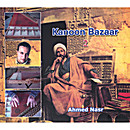Catégories
Africaine1036 Arabe738 Asiatique298 Blues495 Bresilienne226 Europeenne1720 Folk714 Folk Blues20 Modern Folk170 Power-folk60 Traditional Folk382 Funk49 Hip Hop262 Island662 Israelienne15 Jazz1655 Judaica263 Judeo-Arabe161 Latino1619 Pop292 Rai64 Rap218 Reggae1450 Rhythm & Blues188 Rock690 Ska93 Spirituelle1136 World Beat2098 World Fusion3879 CHEQUES - CADEAUX ...3 Nouveaux produits ... Tous les produits ... InformationsPartenaires |
|
Connaissez-vous ...Qui est en Ligne ?Il y a 136 visiteurs en ligne |
|
|



